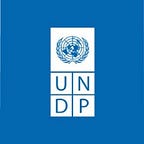‘In every crisis lies an opportunity’ — Covid-19 is triggering a Digital Healthcare Revolution in Azerbaijan
A blog by: Dr. Nabil Seyidov, Head of Health Policy and Planning Department, Public Health and Reforms Center, Ministry of Health of the Republic of Azerbaijan and Sandra Ismanovski, Communications Specialist @UNDPAccLabs Azerbaijan
The Covid-19 pandemic has alerted governments around the world to the limitations of analogue healthcare systems. From the outset it has been clear that a digital revolution is urgently needed to tackle this crisis.
Covid-19 has spread to every country in the world, outpacing the capacities of many health systems to test, track, and contain infection.
Most governments, educational institutions and private companies have managed to switch to online working wherever possible. But many healthcare systems have proven ill-equipped to cope with the pandemic and its impacts, partly on account of the traditional face-to-face model of patient-doctor interactions.
In Azerbaijan, the first case of infection was recorded on 28 February and the first death from Covid-19 was reported on 12 March. At the time of writing, 14 May, Azerbaijan has a total of 2,519 confirmed cases of Covid-19, while 1,650 have recovered and 32 have sadly died.
The Government of Azerbaijan has undertaken remarkable efforts to tackle the immediate challenges of containing the spread of the virus, introducing timely and effective measures.
The Ministry of Health joined forces with UNDP’s Accelerator Lab to address the urgent need to transform healthcare delivery and scale up the system by unleashing the power of digital technologies.
Early on in the crisis, we recognised the need to rapidly deploy innovative digital solutions to help healthcare professionals and members of the public cope with the pandemic.
Our primary focus has been on solutions aimed at immediately improving e-healthcare and electronic resources for medical professionals to advance knowledge in the field of epidemiology and public health.
So what did we do?
One of our first interventions was the development of a coronavirus self-checker bot to help inform people what to do if they have potential symptoms of Covid-19. The bot helps the health authorities answer more queries online, freeing up resources to enable medical professionals to look after patients in need of critical care.
Over the next few weeks, we will deploy tele-healthcare, an e-course platform and an app to support doctors and nurses with latest treatment protocols.
The technology acquired and the IT skills gained developing these digital solutions will be used for further expansion of e-services and tele-healthcare in the country and serve as a blueprint for the future of public health.
These unprecedented solutions are not only helping expand the digital capacity of Azerbaijan’s healthcare system in response to the ongoing pandemic but can be further scaled up to support and improve the system in the post COVID19 era.
For the first time, doctors will have access at their fingertips to the latest scientific information on disease and treatment, no longer needing to rely on often out-of-date sources.
The new e-course platform will be especially helpful for medical professionals in rural areas and other contexts with limited opportunities to attend conferences or training courses in the capital or abroad.
By using e-education, doctors will be able to keep up with the latest medical breakthroughs.
The virtual tele-health platform will also be expanded in use beyond the Covid-19 pandemic, reducing costs of transport and greatly increasing access. It will be especially helpful for the elderly and for those with disabilities who have limited mobility, as well as for all people in remote areas who often cannot afford the costs of travelling to a doctor.
For example, if someone living in a remote village has recently undergone a surgery and needs follow-up advice, they will now be able to get in touch with their doctor online instead of having to travel.
The tele-doctor technology will further give doctors a chance to obtain regular information on their patients, recording new info on a daily basis, such as monitoring their blood pressure and glucose levels, helping to increase the longevity and quality of life of their patients and reducing morbidity.
We believe telemedicine will help revolutionize the level of healthcare provided in health facilities throughout the country, particularly for people in remote areas.
In every crisis lies an opportunity, and Covid-19 has provided an opportunity to apply innovative tech solutions to support the healthcare system in coping with the current crisis — solutions that can now be applied to enhance healthcare for all people throughout Azerbaijan into the future, paving the way for Azerbaijan’s inclusive digital healthcare revolution.
